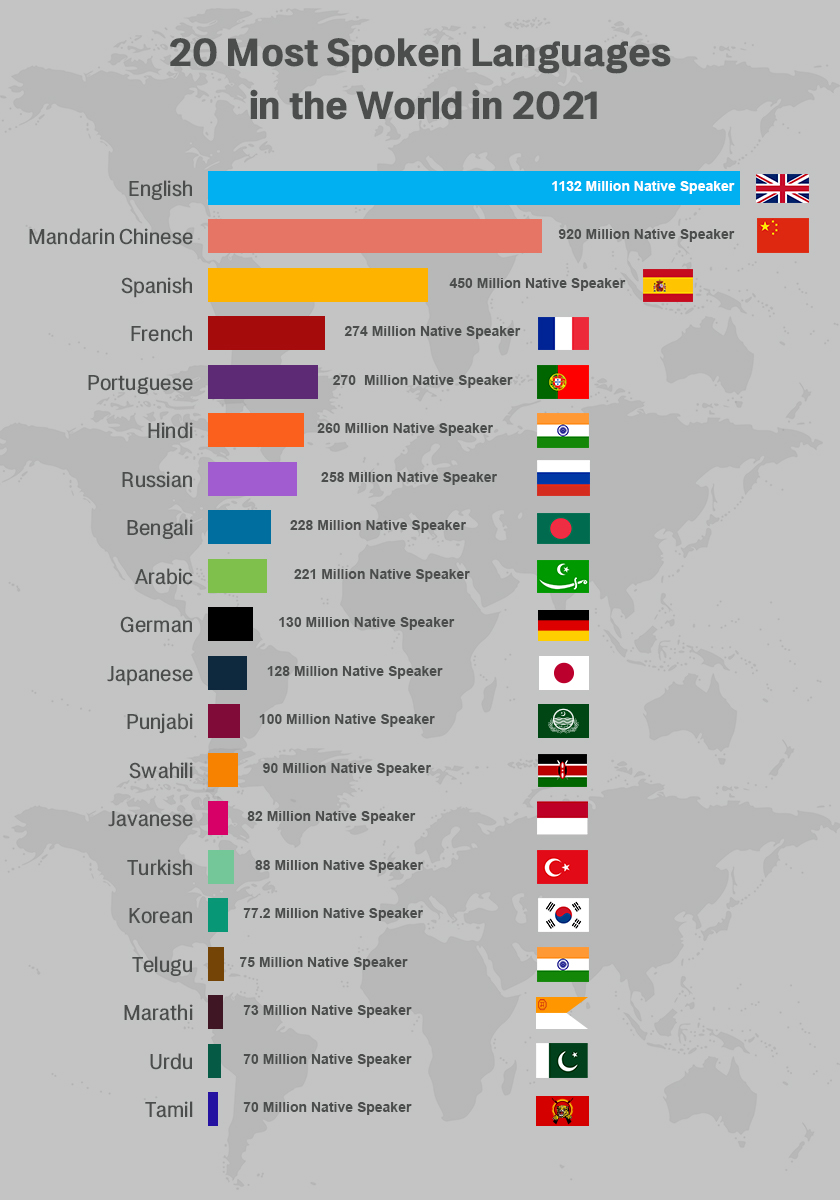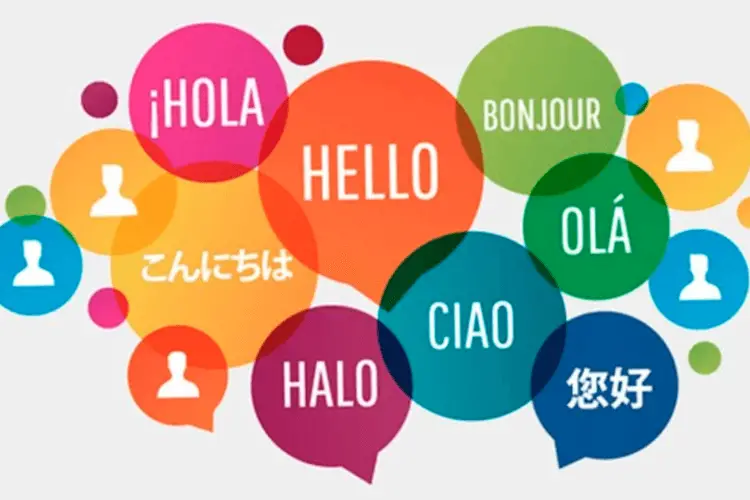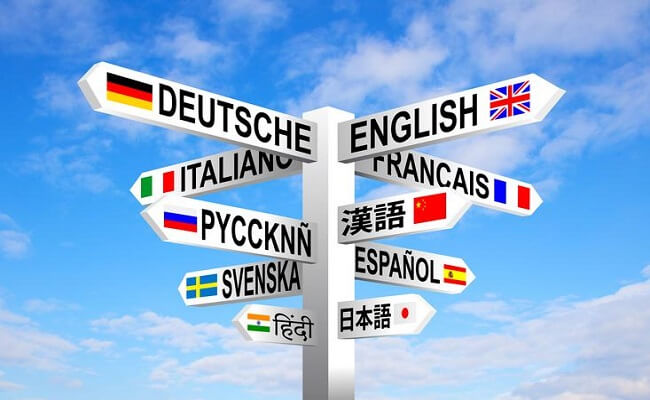What language should I learn? Here, you will see the easiest language to learn from English, most important and useful languages, and important phrases to learn in a foreign language.
In biblical literature, the multiplicity of languages is explained with the story of the Tower of Babel, a structure built in the land of Shinar (Babylonia). As detailed in the first nine verses of the 11th chapter of Genesis, the story looks to relay the events and reasons for diverse human languages. As the story goes, the Babylonians in a bid to make a name for themselves decided to build a mighty city and a tower “with its top in the heavens.”
Not quite pleased with their folly and disrespect, God disrupted the work by so confusing the language of the workers so that they could no longer understand one another. The city was never completed, and the people were dispersed over the face of the earth. The dispersal of these people is what the bible will have us believe is how different places across the globe came to have different tongues. A sensational story with hardly any credence, but the history of mankind is filled with myths and legends.
Diversity is easily the most intriguing feature of human existence. The difference in cultures, ideas, ways of life, and tongues between every human settlement. Of all of these, what makes language arguably most germane is the importance of communication, made all the more significant in today’s global village. There are approximately 6,500 spoken languages in the world today, some far less widely spoken than others, and some simply sacrosanct.
There has never been a time when fluency in two or more other languages have been so important for success and even cohabitation in the world as it is now. The heightened mobility of today’s world has necessitated the ability to communicate in other languages as it doesn’t only give an edge, but also create ease for those who possess such qualities. In other words, learning a new language hasn’t been more important than it is now.
In this article, we will look at language under several headings as we try to determine what languages are the most important today, and those that one needs to learn with relevance to our fields of endeavour. First, enjoy these ten fun facts about languages.
10 interesting facts about languages
- There is a language that is spoken by only eight people in the world. The Busuu language of Southern Bantoid, Cameroon, had only eight speakers in 1986 and just three in 2005.
- The US has no official language, with over 300 spoken languages in the United States, none has been agreed upon as an official language. If you thought English is the official US language, you thought wrong.
- Half of the world’s population speak just 23 languages. This is quite interesting when one considers the fact that there are almost 7,000 languages at our disposal.
- Papua New Guinea has over 800 languages. It is the country with the most number of languages in the world, with 841 languages in total. Up to 40 of them are going extinct, though, because there’s nobody to speak them.
- The three oldest written languages are Sumerian, which dates back to 3500BC, followed by Egyptian, which dates back to 3300BC, and then Old Chinese, dating back to 1250BC.
- The Papuan language of the Rotokas is the language with the smallest number of alphabets, with just 11 alphabets in total. Conversely, the Cambodian language has the longest alphabet with more than 73 characters.
- Almost all languages in the world have been influenced by other languages under immigration and cultural mobility. However, the Basque language spoken in the mountains between Spain and France is the only language with no correlation with any other language in the world.
- South Africa is the country with the most official languages in the world, with 11 official languages. As opposed to the US that has failed to decide on one.
- Chinese Mandarin is the most spoken language in the world with about 1.3 billion speakers. It is, however, is mainly due to the population of the region. English is the most widely adopted and spoken language in the world. In fact, it is the official language of the air, as everywhere in the world, pilots and cabin crews understand English.
- Chinese Mandarin is considered the toughest language to learn in the world. This is largely because the language has no alphabets, but symbols. An average Chinese knows 8000 symbols, and one must know at least 3000 symbols to be able to read a newspaper.
Related article: Nigerian Pidgin English approved as a foreign language at the Oscars.
Most important and useful languages to learn
There are about 23 languages spoken by half of the world’s population. This would suggest these are the most useful languages to mankind. Of the 23, some are more widely spoken than the others. Here is a list of what is considered the ten most important languages in the world.
English
English is spoken by over 75% of the world’s population and is the official language of a considerable number of nations. It is the most influential academic and business language in today’s world. In addition, over half of all websites are written in English. It is safe to say, to be a global citizen, one must learn and understand conversational English at least. You can improve your English speaking skills through this website.
Chinese Mandarin
Keyword; population. Chinese Mandarin is known to be the fastest-growing language in the world. This can almost be directly linked to the continued population increase of the region. It is spoken by more than 1.2 billion people. It is the second most popular language among internet users. With China’s massive growth in commerce and technology, the country is predicted to be the world’s leading economy by 2050. It won’t be farfetched to expect the language to overtake English in the not so distant future.
Spanish
When it comes to choosing a language to learn, Spanish often rises to the top of the list for English speakers. And it’s not without reason. With its widespread use across the globe, learning Spanish opens up doors both personally and professionally. But what makes Spanish particularly attractive as a beginner language is its relatively straightforward grammar and pronunciation rules. Unlike many other languages, once you grasp some basic concepts, you can quickly start forming sentences and engaging in conversations.
According to several sources, the language is on a steady growth largely because of the United States Spanish community. As of 2020, an estimated total of 37 million people speaks Spanish as their first language in the US. In addition, about 50 million people in the US know the language. These numbers are expected to double in the next 30 years. Try this website and start speaking Spanish in no time.
German
Germany is a world power. It is therefore not surprising that German ranks 4th as the most widely spoken language in the world. This is aided by Germany’s position in commerce and industry. According to Business Analysts, international establishments pay workers with German language skills 4% more than others.
Portuguese
Portuguese is the second most spoken language of Latin America, behind Spanish. It is also spoken in Brazil and some African countries by over 200 million people. The language is also experiencing a good degree of growth due to Brazil’s success in science and business, and tourism.
Arabic
Arabic is currently the official language of 28 countries. Two things that these countries are known for is commerce and export, and because of this, the language is fast growing. Not too long ago, Arabic was ranked as the second most important “language of the future” in a report by the British Council. You can learn Arabic from LearnArabic.com from the convenience of your home.
French
Through colonization, the French language became one of the most widely spoken languages across the world. With 29 countries (many of which are African) speaking French as their official language, French is spoken more by non-natives than French citizens. It is also the second most spoken language in the EU.
Japanese
Similar to China, Japan has been on a fast rise in terms of technology, innovation, electronics and robotics. The language, therefore, has been unavoidably part of the country’s exports. About $88 billion of e-commerce revenue is courtesy of Japanese speaking internet users.
Russia
Just like Germany, Russia is a known world economic and political powerhouse. The Russian language is one of the official UN languages. Sitting closely behind English as the most used website language. The language is considered one of the most useful ones to learn.
Hindi
Although English is the most widely spoken language in India, it is not as perfectly understood and fluent amongst its speakers. The region is also seen as one of the most important emerging economies. They have seen an increase in investments in technology, connectivity, and mobile penetration from their government, and this has attracted international investment too. For these reasons, the language continues to grow in importance.

What language should I learn?
The section above essentially answers this question. When considering the language to learn, one first needs to ask the question, “What purpose does it serve?”. That is in case there is no clear cut reason that has prompted the need in the first place. From the assessment of useful languages treated above, the importance of these languages are brought to bare, including the different fields where they are most useful.
For millennials, English is by far the most useful language, mainly because it is the leading language of the internet. It should be the first to be considered for people who fall within this category.
For people who do business majorly within the African continent, French will be the obvious option. With about 11 African countries speaking French as their official language, one undoubtedly has an edge as a French speaker doing business in the continent. The language is widely spoken in Europe and Canada too, and that makes a superb advantage both for general communication and career prospects.
Japanese is definitely a boost for people in the electronics, AI, and technology industries. With knowledge of the language, you have a good advantage and limitless possibilities living in Japan or brokering business with Japanese establishments. Not to mention the e-commerce aspect where the language greatly thrives.
Anyone who has intentions of doing business or any major dealings in the middle east will be doing themselves a huge favour by getting to know Arabic. The language can also serve a purpose in the African continent as a handful of countries speak it there also.
Tourism and science in Latin America will go a lot smoother for prospective investors and key players with the knowledge of either Portuguese or Spanish. Not forgetting that the languages are relevant in the EU as well as parts of Africa too.
The importance attached to Germany in commerce, technology and politics speak for itself. It will be an astute addition to the arsenal of anyone who wishes to work in such an industry, as well as diplomats. Russian is also a good addition for anyone who aspires to be a player in world politics.
Without a doubt, Mandarin, although, difficult to learn, is a huge boost for any and everyone who wishes to be a part of the progressive world. The numbers and estimates say the country will be the leading economy in just 30 years, and it is proper to expect that the earliest beneficiaries will mostly be those skilled in the language.
There is something for everyone to choose amongst these world’s leading languages. At the end of the day, one’s choice will largely be determined by needs before leisure. The fact remains, one language will no longer be enough to make anyone a world citizen as the years go by.
Easiest language to learn from English
One of the most frequently asked questions concerning languages is which is the easiest to learn. While some are more difficult than others, no foreign language is easy to learn. A lot of factors have been recognised to play a role in the “ease” of learning new languages. In no particular order, factors like the learner’s motivation, learner’s native language, and learner’s other languages.
These factors, for obvious, reasons are deemed the most important. For motivation, it is an important ingredient in any human endeavour. One’s motivation is what drives us and keeps us going even when it gets hard. Motivation can sometimes be determined by the reason behind the endeavour, in this case, why you are learning the new language.
The importance of the native tongue goes without saying. Some languages are more dynamic than others. This factor, maybe, explains why English is usually seen as the benchmark because it borrows from almost every language known to man. Therefore, it offers a fairly good background for learning other languages.
Lastly, other languages. Knowing another language will more often than not make learning a new one easier. For instance, a speaker of English and French will learn Spanish way easier than someone who only speaks Mandarin and German.
Also read: Fashion design schools in Nigeria: UniAbuja and polytechnics that offer fashion designing courses.
According to the Foreign Service Institute (FSI), a United States government’s diplomatic training agency, based on similarity to the English language, here is a list of easiest languages to learn, in descending order of difficulty:
- Afrikaans
- Danish
- Dutch
- French
- Italian
- Norwegian
- Portuguese
- Romanian
- Spanish
- Swedish
The patterns and statistics will, of course, be different for speakers of other official languages.
Important phrases to learn in a foreign language
When learning a new language, you will quickly realise that some phrases and expressions are more important for beginners. These phrases range from simple greetings, passing compliments, and expressing need for help. They are phrases that can get you going and sometimes out of tough situations. Here is a list of 25 important phrases and expressions to learn in a new foreign language.

1. Hello.
2. Yes and No.
3. My name is…./ What is your name?
4. Please… Thank You.
5. Excuse me… I’m sorry.
6. I don’t speak your language well.
7. Please say that again.
8. Goodbye.
9. Please, I need help.
10. Call the police/ambulance.
11. How much is it?
12. Where is the restroom?
13. Do you speak English?
14. Numbers 1 to 100.
15. You’re welcome.
16. Nice to meet you.
17. How are you?
18. Where are you from?
19. What do you do?
20. How do I get to…?
21. What is this?
22. How do you say…?
23. I don’t understand.
24. I need a doctor.
25. Where can I…?
The list goes on. As you can see, all of these expressions will aid quick communication of thoughts and will make integration a lot easier.
Conclusion
Communication is one of the leading currencies of human existence, and languages are its vehicles. Globalisation is making the world a smaller place where people from far opposite ends of the atlas are mandated to communicated for different reasons and purposes, and because of this, having more than one language is now more of a necessity than luxury.
Now is the time to consider and start learning whatever language one deems necessary because if the predictions are right, surviving in the new world will be almost impossible without it.
You may also like to read our latest article, Everything you need to know about Lagos Business School.


